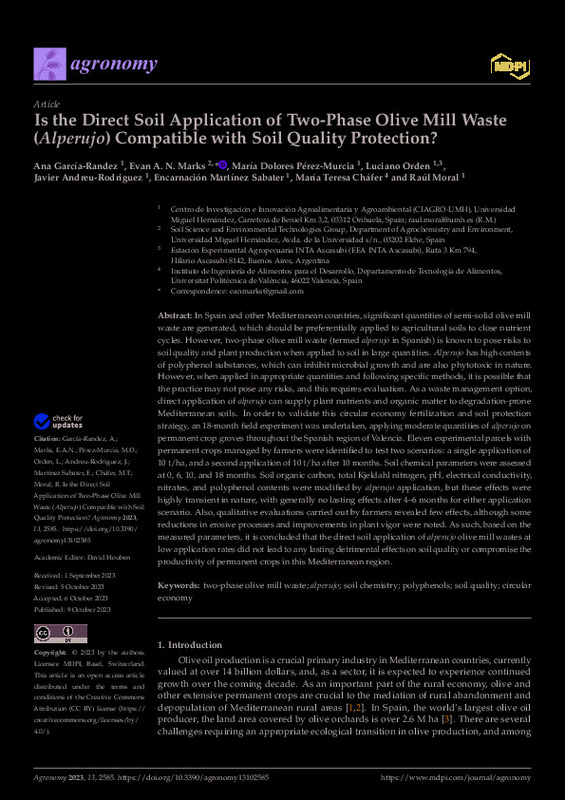JavaScript is disabled for your browser. Some features of this site may not work without it.
Buscar en RiuNet
Listar
Mi cuenta
Estadísticas
Ayuda RiuNet
Admin. UPV
Is the Direct Soil Application of Two-Phase Olive Mill Waste (Alperujo) Compatible with Soil Quality Protection?
Mostrar el registro sencillo del ítem
Ficheros en el ítem
| dc.contributor.author | García-Randez, Ana
|
es_ES |
| dc.contributor.author | Marks, Evan A.N.
|
es_ES |
| dc.contributor.author | Pérez-Murcia, María Dolores
|
es_ES |
| dc.contributor.author | Orden, Luciano
|
es_ES |
| dc.contributor.author | Andreu-Rodriguez, Javier
|
es_ES |
| dc.contributor.author | Martínez Sabater, Encarnación
|
es_ES |
| dc.contributor.author | Cháfer Nácher, Maite
|
es_ES |
| dc.contributor.author | Moral, Raúl
|
es_ES |
| dc.date.accessioned | 2024-04-11T11:40:45Z | |
| dc.date.available | 2024-04-11T11:40:45Z | |
| dc.date.issued | 2023-10 | es_ES |
| dc.identifier.uri | http://hdl.handle.net/10251/203407 | |
| dc.description.abstract | [EN] In Spain and other Mediterranean countries, significant quantities of semi-solid olive mill waste are generated, which should be preferentially applied to agricultural soils to close nutrient cycles. However, two-phase olive mill waste (termed alperujo in Spanish) is known to pose risks to soil quality and plant production when applied to soil in large quantities. Alperujo has high contents of polyphenol substances, which can inhibit microbial growth and are also phytotoxic in nature. However, when applied in appropriate quantities and following specific methods, it is possible that the practice may not pose any risks, and this requires evaluation. As a waste management option, direct application of alperujo can supply plant nutrients and organic matter to degradation-prone Mediterranean soils. In order to validate this circular economy fertilization and soil protection strategy, an 18-month field experiment was undertaken, applying moderate quantities of alperujo on permanent crop groves throughout the Spanish region of Valencia. Eleven experimental parcels with permanent crops managed by farmers were identified to test two scenarios: a single application of 10 t/ha, and a second application of 10 t/ha after 10 months. Soil chemical parameters were assessed at 0, 6, 10, and 18 months. Soil organic carbon, total Kjeldahl nitrogen, pH, electrical conductivity, nitrates, and polyphenol contents were modified by alperujo application, but these effects were highly transient in nature, with generally no lasting effects after 4-6 months for either application scenario. Also, qualitative evaluations carried out by farmers revealed few effects, although some reductions in erosive processes and improvements in plant vigor were noted. As such, based on the measured parameters, it is concluded that the direct soil application of alperujo olive mill wastes at low application rates did not lead to any lasting detrimental effects on soil quality or compromise the productivity of permanent crops in this Mediterranean region. | es_ES |
| dc.description.sponsorship | This research was funded by the Valencian regional government (Conselleria de Agricultura, Desarrollo Rural, Emergencia Climática y Transición Ecológica) within the Agrocomposting project. The authors also express their gratitude for support from Cooperatives Agro-alimentàries of the Valencian Community. | es_ES |
| dc.language | Inglés | es_ES |
| dc.publisher | MDPI | es_ES |
| dc.relation.ispartof | Agronomy | es_ES |
| dc.rights | Reconocimiento (by) | es_ES |
| dc.subject | Two-phase olive mill waste | es_ES |
| dc.subject | Alperujo | es_ES |
| dc.subject | Soil chemistry | es_ES |
| dc.subject | Polyphenols | es_ES |
| dc.subject | Soil quality | es_ES |
| dc.subject | Circular economy | es_ES |
| dc.subject.classification | TECNOLOGIA DE ALIMENTOS | es_ES |
| dc.title | Is the Direct Soil Application of Two-Phase Olive Mill Waste (Alperujo) Compatible with Soil Quality Protection? | es_ES |
| dc.type | Artículo | es_ES |
| dc.identifier.doi | 10.3390/agronomy13102585 | es_ES |
| dc.rights.accessRights | Abierto | es_ES |
| dc.contributor.affiliation | Universitat Politècnica de València. Escuela Técnica Superior de Ingeniería Agronómica y del Medio Natural - Escola Tècnica Superior d'Enginyeria Agronòmica i del Medi Natural | es_ES |
| dc.description.bibliographicCitation | García-Randez, A.; Marks, EA.; Pérez-Murcia, MD.; Orden, L.; Andreu-Rodriguez, J.; Martínez Sabater, E.; Cháfer Nácher, M.... (2023). Is the Direct Soil Application of Two-Phase Olive Mill Waste (Alperujo) Compatible with Soil Quality Protection?. Agronomy. 13(10). https://doi.org/10.3390/agronomy13102585 | es_ES |
| dc.description.accrualMethod | S | es_ES |
| dc.relation.publisherversion | https://doi.org/10.3390/agronomy13102585 | es_ES |
| dc.type.version | info:eu-repo/semantics/publishedVersion | es_ES |
| dc.description.volume | 13 | es_ES |
| dc.description.issue | 10 | es_ES |
| dc.identifier.eissn | 2073-4395 | es_ES |
| dc.relation.pasarela | S\504063 | es_ES |
| dc.contributor.funder | Generalitat Valenciana | es_ES |








